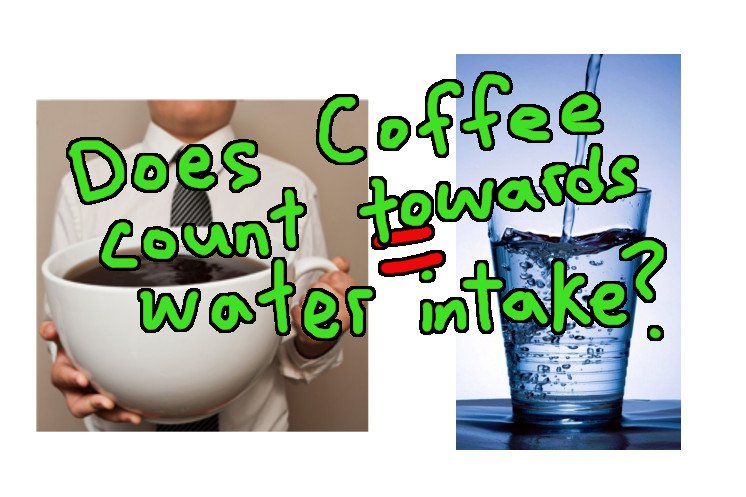Does Coffee and Tea Count Towards Water Intake?
I always thought that drinking beverages that contain caffeine such as coffee and tea dehydrate you and thus you shouldn't count them as part of your water intake. Caffeine is considered as diuretic, meaning it increases urination, but is this true for regular caffeine intake? After doing some research it appears there is no evidence for this and regular caffeine intake does in fact count towards water intake.
Watch video on:
- BitChute: https://www.bitchute.com/video/LCmFpDjHoVi6/
- 3Speak:
- DTube: https://d.tube/#!/v/mes/1edlge49m9z
- YouTube: https://youtu.be/WMVpJatcktg
Download video notes: https://1drv.ms/b/s!As32ynv0LoaIiLhGlz9lKeIHz5qKag?e=J2Z9k5
View Video Notes Below!
Download these notes: Link is in video description.
View these notes as an article: https://peakd.com/@mes
Subscribe via email: http://mes.fm/subscribe
Donate! :) https://mes.fm/donateReuse of my videos:
- Feel free to make use of / re-upload / monetize my videos as long as you provide a link to the original video.
Fight back against censorship:
- Bookmark sites/channels/accounts and check periodically
- Remember to always archive website pages in case they get deleted/changed.
Join my private Discord chat room: https://mes.fm/chatroom
Check out my Reddit and Voat math forums:
Buy "Where Did The Towers Go?" by Dr. Judy Wood: https://mes.fm/judywoodbook
Follow along my epic video series:
- #MESScience: https://mes.fm/science-playlist
- #MESExperiments: https://peakd.com/mesexperiments/@mes/list
- #AntiGravity: https://peakd.com/antigravity/@mes/series
-- See Part 6 for my Self Appointed PhD and #MESDuality breakthrough concept!- #FreeEnergy: https://mes.fm/freeenergy-playlist
NOTE #1: If you don't have time to watch this whole video:
- Skip to the end for Summary and Conclusions (if available)
- Play this video at a faster speed.
-- TOP SECRET LIFE HACK: Your brain gets used to faster speed. (#Try2xSpeed)
-- Try 4X+ speed by browser extensions or modifying source code.
-- Browser extension recommendation: https://mes.fm/videospeed-extension
-- See my tutorial to learn more: https://peakd.com/video/@mes/play-videos-at-faster-or-slower-speeds-on-any-website- Download and read video notes.
- Read notes on the Hive blockchain #Hive
- Watch the video in parts.
NOTE #2: If video volume is too low at any part of the video:
- Download this browser extension recommendation: https://mes.fm/volume-extension
Does Coffee and Tea Count Towards Water intake?

This video is a follow up video to my earlier video on Daily Water Intake (http://youtu.be/uvxU09XmQNU)
Most of the information in this video is taken from:
Maughan, R. J. & Griffin, J. 2003. Caffeine ingestion and fluid balance: a review. The British Dietetic Association Ltd, Journal of Human Nutrition & Dietetics. Volume 16. Pages 411 – 420.
https://1drv.ms/b/s!As32ynv0LoaIiLhEADNhbKQYi8ALKA?e=M4eN8N
Caffeine is recognized as having a diuretic effect, which means increases urination, and consumers are often advised to avoid beverages containing caffeine in situations where hydration may be compromised.
But does regular caffeine intake (i.e. coffee, tea, soft drinks) really dehydrate you?
The paper involved a review of the available published literature “concerning the effect of caffeine ingestion on water balance and to formulate targeted and evidence-based advice on caffeinated beverages in the context of optimum hydration.”
The reviewed literature were from available papers from the Medline database of articles published in the medical and scientific literature for the period of January 1966 – March 2002 on caffein ingestion.
Medline Website: http://www.nlm.nih.gov/pubs/factsheets/medline.html
The study showed ingesting caffeine in large doses (at least 250-300 mg, about 2 to 3 cups of coffee or 5-8 cups of tea) results in a short-term stimulation of urine output in individuals who have been deprived of caffeine for a period of days or weeks.
A profound tolerance to the diuretic and other effects of caffeine develops, however, and the actions are much diminished in individuals who regularly consume tea or coffee.
Doses of caffeine equivalent to the amount normally found in standard servings of tea, coffee and carbonated soft drinks appear to have no diuretic effect.
The review found that there was no evidence found in published studies that suggested consumption of caffeine-containing beverages as part of a normal lifestyle leads to fluid loss in excess of the volume ingested or is associated with poor hydration status.
Thus the study concludes that there is no clear basis for refraining from caffeine containing drinks in situations where fluid balance might be compromised.
In other words, coffee and tea can be considered as part of your daily water intake.
You can also read more on this by reading this article:
http://www.discovergoodnutrition.com/2012/09/plain-water-get-your-8-glasses-a-day/